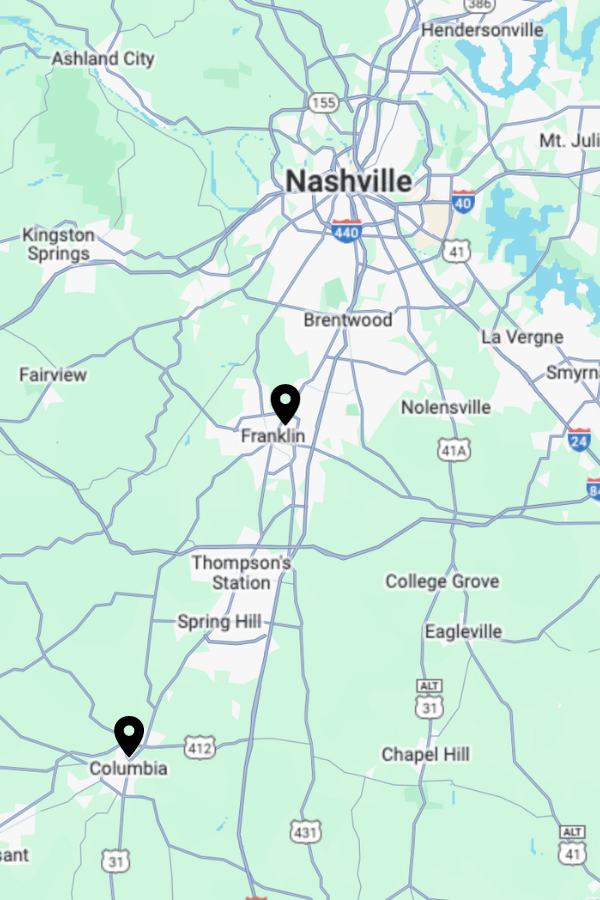Apex Recovery operates two rehab facilities in Tennessee, offering specialized care for substance abuse recovery. With a commitment to personalized healing, our strategically located centers provide support and compassion in environments, ensuring accessibility for those seeking lasting recovery
Apex Substance Abuse Recovery Center specializes in dual diagnosis and co-occurring disorders, providing comprehensive recovery programs. With a tailored approach, our expert team addresses both substance abuse and underlying mental health issues. Our commitment to integrated care ensures you receive effective treatment for a smooth recovery and overall well-being.

Understanding Dual Diagnosis Disorder (Addiction & Mental Health)
Dual Diagnosis Disorder is the coexistence of a mental health disorder and substance use addiction. This condition presents a complex challenge. In many cases, these disorders interact in ways that exacerbate the severity of each other, often leading to a more intricate recovery process.
The term “Co-Occurring Disorder” is sometimes used interchangeably with Dual Diagnosis, although it technically refers to situations where a person may be dealing with more than two disorders at the same time. This includes a range of conditions that can coexist with substance abuse, including various mental health issues, behavioral disorders, or even physical health problems.
How Much Does Dual Diagnosis Treatment Cost Without Insurance?
The dual diagnosis cost of treatment without insurance can vary significantly, typically ranging from $3,000 to $20,000 per month. Factors influencing the price include the type of facility, the level of care required, the length of the program, and the specific therapies offered. This broad range depends on treatment approaches, from outpatient counseling to intensive inpatient programs.
The higher end of the co-occurring treatment cost spectrum often includes luxury rehab centers that provide extensive amenities and personalized care. In contrast, more cost-effective dual diagnosis treatment options might include basic inpatient facilities or outpatient programs. Some facilities offer payment plans to help make dual diagnosis care expenses more accessible for those without insurance.
National Dual Diagnosis Disorder Statistics in the United States (US)
Of the over 20 million U.S. adults with Substance Use Disorder (SUD), a significant 37.9% also struggle with mental illnesses, and among the 42 million with mental illness, 18.2% battle SUD. This overlap indicates that 9.2 million adults face the complexities of co-occurring mental and substance use disorders.
However, treatment access remains a significant challenge, as 52.5% of those with dual diagnosis do not receive the necessary care, and only 9.1% are treated for both conditions. Additionally, 23.8% of individuals with co-occurring disorders are unsure of where to seek help. Moreover, among youth aged 13-18 receiving mental health services, an alarming 40.8% also have SUD.
Free Addiction Assessment
Schedule a free, confidential assessment with a licensed clinician. Apex Recovery can check your insurance coverage levels for drug and alcohol addiction, and mental health treatment.

- Please complete and send the form below.
- One of our staff members will contact your insurer to check your coverage.
- We will contact you promptly with the results and to discuss the next steps.
Insurance Verification
"*" indicates required fields
Types of Dual Diagnosis Rehabilitation Treatment in Tennessee
When looking for dual diagnosis rehabilitation, it’s important to find programs specifically tailored for certain combinations of mental health and substance use disorders. This includes targeted treatments for issues like Alcohol Use Disorder (AUD) and Depression, Bipolar and Substance Use Disorder, Anxiety, as well as PTSD and Attention-Deficit/Hyperactivity Disorder (ADHD).
Specialized care also extends to those with Borderline Personality Disorder (BPD), Eating Disorders, and other Personality Disorders co-occurring with substance misuse. Let’s take a closer look at these dual diagnosis Integrated rehabilitation programs.
Alcohol Use Disorder (AUD) and Depression
Alcohol Use Disorder (AUD) and Depression requires a nuanced treatment approach, as the two conditions often intensify each other. Effective dual diagnosis rehabilitation integrates recovery-oriented interventions such as Cognitive-Behavioral Therapy (CBT) to modify negative thought patterns. Support groups and counseling also play a crucial role in providing a sense of community and coping strategies for managing AUD and Depression concurrently.
Anxiety and Substance Use Disorders
The concurrent presence of Anxiety Disorders and Substance Use Disorders, involving drug and alcohol addiction, creates a complex treatment landscape. People often turn to substances as a way to self-medicate anxiety symptoms, leading to a cycle where substance use exacerbates anxiety, and increased anxiety fuels further substance abuse. Addressing this dual diagnosis requires a careful, integrated behavioral care approach.
Treatment typically includes behavioral therapies, and the psychotherapy and counseling costs may be covered by insurance. Medication may also be used, particularly for stabilizing anxiety symptoms, while carefully monitoring to avoid potential substance misuse. The focus is on breaking the cycle of anxiety and addiction, providing tools for long-term management and relapse prevention of both conditions.
Bipolar and Substance Use Disorder
Managing the co-occurrence of Bipolar Disorder and Substance Use Disorder requires specialized dual diagnosis rehabilitation. This approach focuses on treating both the mood disorder and addictive behaviors. Key strategies include mood-stabilizing medication-assisted treatment and behavioral health treatment, which help individuals understand and manage the intricate relationship between drug and alcohol addiction and Bipolar Disorder.
PTSD and Substance Use
The co-occurrence of Post-Traumatic Stress Disorder (PTSD) and Substance Use, particularly drug and alcohol addiction, demands an integrated treatment approach. People often use substances to cope with PTSD, leading to a cycle where addiction worsens PTSD symptoms. Things can degrade even more if a person has other conditions like bipolar disorder.
Effective treatment involves therapies like Trauma-Focused Cognitive Behavioral Therapy (TF-CBT) and Eye Movement Desensitization and Reprocessing (EMDR) for PTSD, alongside addiction-focused interventions for substance use. This comprehensive approach treats both conditions simultaneously, addressing the trauma at the heart of PTSD and breaking the cycle of addiction.
Borderline Personality Disorder (BPD)
Borderline Personality Disorder (BPD) and Substance Misuse, often involving drug and alcohol addiction, can be challenging for people and families. People with BPD may engage in substance misuse as a coping mechanism for their intense emotional fluctuations and unstable self-image, which can be intensified with other conditions like bipolar disorder and similar illnesses.
Taking an integrated treatment approach to manage the symptoms of BPD while breaking the patterns of addiction recognizes the unique challenges posed by the co-occurrence of BPD and drug and alcohol addiction.
Personality Disorders and Substance Misuse
The co-occurrence of Personality Disorders and Substance Misuse, often involving drug and alcohol addiction, necessitates a specialized and comprehensive treatment approach. Individuals with personality disorders may fall into substance misuse as a way to cope with emotional dysregulation, impulsivity, or interpersonal difficulties associated with their personality disorder.
Treating this dual diagnosis requires a nuanced understanding of the specific personality disorder, whether bipolar disorder or something else, and its relationship with substance misuse. Addiction-focused interventions, including dual diagnosis counseling and relapse prevention strategies, aim to break the cycle of substance misuse.
Attention-Deficit/Hyperactivity Disorder (ADHD) and Substance Use Disorder
The coexistence of Attention-Deficit/Hyperactivity Disorder (ADHD) and Substance Use Disorder, particularly involving drug and alcohol addiction, presents many challenges in dual diagnosis treatment. Individuals with ADHD are at a heightened risk of developing substance use disorders, often using drugs or alcohol as a means to cope with ADHD symptoms like impulsivity, hyperactivity, and difficulty concentrating.
Treatment typically involves a combination of pharmacotherapy for dual diagnosis, using medications to manage ADHD symptoms effectively, and behavioral interventions targeting addiction. Co-occurring disorders therapy is particularly beneficial, helping individuals develop strategies for impulse control and better decision-making skills, particularly in those with other more serious conditions like bipolar disorder.
Eating Disorders and Substance Misuse
The intersection of Eating Disorders and Substance Misuse, involving drug and alcohol addiction, requires a comprehensive treatment approach. People with eating disorders may turn to substance misuse as a way to control weight or cope with emotional distress related to their eating disorder. Tackling this dual diagnosis is crucial for effective treatment and recovery.
An integrated treatment plan typically includes a combination of nutritional counseling and psychological therapies to address the root causes of the eating disorder, alongside interventions for substance misuse. Things can become more complicated if individuals have bipolar disorder, and other behavioral health issues. Group therapy and support groups can be part of a whole-person approach, with peer support and a sense of community, which are important for long-term recovery.

Apex Recovery Dual Diagnosis Rehab Centers in TN that Offer Payment Plans
Apex Recovery is committed to making dual diagnosis treatment accessible through flexible payment plans. If you or a loved one needs help, call us at (877) 881-2689 to discuss options. We offer affordable care solutions at our rehab centers Tennessee, ensuring comprehensive support for your recovery journey.
Treatment Centers in Tennessee that Offer Payment Plans
Apex Recovery Tennessee provides accessible dual diagnosis treatment at three facilities. Our Franklin center, serves quality care. Additionally, we have Apex Recovery Columbia Inpatient and Outpatient facilities. These strategically positioned centers offer comprehensive and flexible payment plans.
Apex Recovery Franklin
4601 Carothers Pkwy STE 250A
Franklin, TN 37067
Apex Recovery Columbia
2710 Trotwood Ave STE A & B
Columbia, TN 38401
Free Addiction Assessment
Schedule a free, confidential assessment with a licensed clinician. Apex Recovery can check your insurance coverage levels for drug and alcohol addiction, and mental health treatment.

Does Health Insurance Cover Dual-Diagnosis Therapy and Treatment in TN?
Yes, health insurance typically covers dual-diagnosis therapy and treatment. The extent of this coverage, however, can vary. Most insurance plans, especially those compliant with the Affordable Care Act (ACA), are required to cover mental health and substance use disorder services as essential health benefits. This means that treatments for dual-diagnosis are generally included under standard health insurance policies.
Nevertheless, it’s important for you to verify the specifics of your dual diagnosis insurance reimbursement. This includes understanding different types of treatments, such as inpatient or outpatient mental health and addiction services, medication management, and therapy sessions. Additionally, details such as co-pays, deductibles, and any potential limitations on the number of covered sessions should be clarified. Contact us at Apex Drug and Alcohol Addiction Recovery Center, check your insurance now, or call us at (877) 881-2689 to discuss. See our insurance page for more details.
Can You Pay for Co-Occurring Disorder Rehabilitation If You Don’t Have Health Insurance?
If you don’t have health insurance, there are still options available to access co-occurring disorder rehabilitation. Many rehabilitation facilities, including Apex Alcohol and Drug Addiction Recovery Center, offer various payment plans and financial assistance programs to make treatment more accessible.
If you’re considering co-occurring disorder rehabilitation but don’t have health insurance, call Apex Addiction Recovery Center in Tennessee. Our team is dedicated to assisting people in finding suitable payment options and discussing available financial assistance programs. We can be reached at (877) 881-2689.
Evaluating the Value of Investing in Co-Occurring or Dual Diagnosis Treatment
Investing in co-occurring or dual diagnosis treatment offers both cost-effective and health-related advantages. Opting for integrated treatment for co-occurring disorders is often more economical than paying for separate treatments for mental health and substance use issues individually. Treating these conditions together streamlines resources, reduces overall healthcare costs, and avoids potential complications if the disorders are addressed in isolation.
Dual diagnosis treatment offers substantial health benefits by comprehensively addressing both mental health and addiction aspects, fostering sustainable recovery and reducing the risk of relapse. This integrated approach enhances overall well-being and, in the long term, paying the mental health and substance abuse treatment costs proves financially advantageous by preventing the recurrence of complex and costly health challenges associated with untreated co-occurring disorders.
Free Addiction Assessment
Schedule a free, confidential assessment with a licensed clinician. Apex Recovery can check your insurance coverage levels for drug and alcohol addiction, and mental health treatment.
Dual Diagnosis Disorder Treatment Statistics in Tennessee
- 13.5% of adults admitted for dual diagnosis
- Approximately 24,000 TN adults received evidence-based practices for dual diagnosis
- 28% of admitted adults had co-occurring condition
- 2.3% of admitted children in TN had co-occurring condition
- 50% of homeless people in TN have co-occurring disorders
- 51% of suicides involved indivduals with dual diagnosis
- 5,431 TN individuals with dual diagnosis who received short-term financial support for services
Sources:
National Statistics Regarding Dual Diagnosis Disorder Treatment
- 9.2 million adults have co-occurring mental and substance use disorders
- Of the more than 20 million adults with SUD, 37.9% also had mental illnesses
- Out of 42 million adults with mental illness, 18.2% had SUD
- 52.5% of people with dual diagnosis did not receive treatment
- 9.1% of those received treatment for both mental health and substance use
- 23.8% of those with co-occurring disorders don’t know where to get treatment
- 40.8% of youth aged 13-18 receiving mental health treatment had SUD
Sources:


